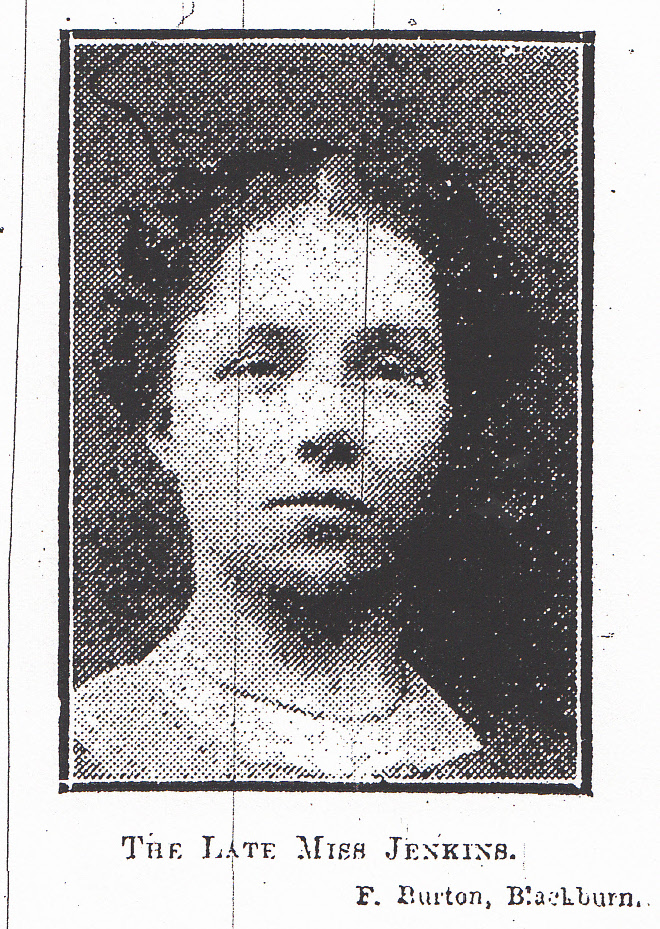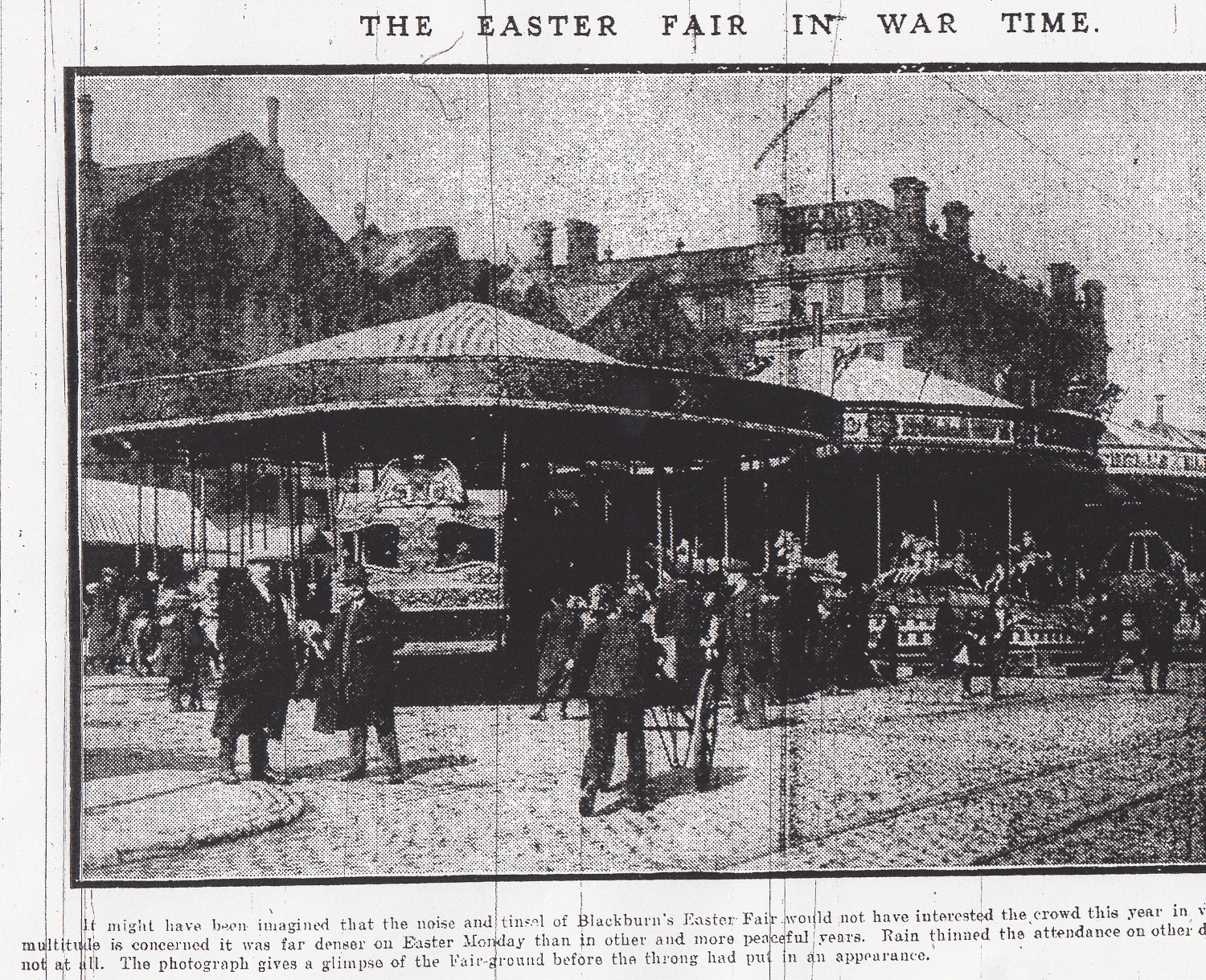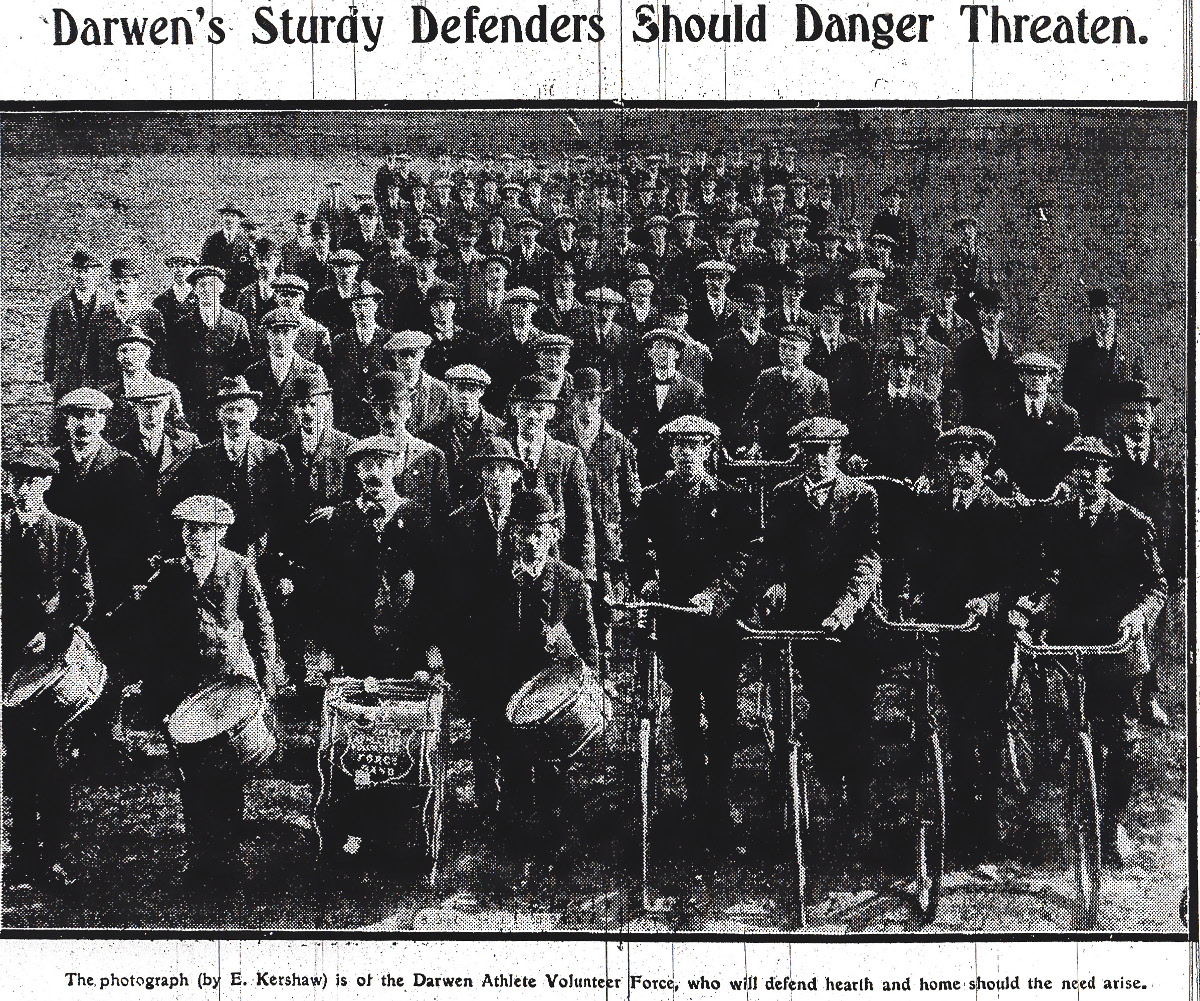Blackburn Times 3rd April 1915
IN THE EVENT OF BOMBARDMENT
HOME OFFICE INSTRUCTIONS TO BLACKBURNThe Chief Constable (Mr C. Hodgson) has sent out to the quarter’s concerned copies of the following circular received from the Home Office in regard to the placing of distinguishing signs on certain buildings “in the event of bombardment or hostile landing”—“The Secretary of State having received inquiries as to whether, in the event of a bombardment or hostile landing, civil hospitals, and asylums, etc., should fly the Red Cross flag or display any other distinguishing sign, he thinks it well to state that Article 27 of the Annex to the Hague Convention of 1907 provides that hospitals and places where the sick and wounded are collected, buildings dedicated to public Worship, art, sciences or charitable purposes, and historic monuments, provided that they are not being used at the time for military purposes. It is necessary that they should be clearly indicated by distinctive and visible signs which have been notified to the enemy beforehand; and the sign which it is proper to use for this purpose in the event of bombardment is not the Red Cross flag but the sign which is specified in the portion of the Hague Convention dealing with bombardments by naval forces and which has also been notified by the British Government for protection in the event of bombardment by land and air, viz. a large stiff rectangular panel divided diagonally into two painted Triangular portions, the upper portion black and the lower portion white. The only hospitals which are entitled to use the Red Cross emblem are those which are exclusively under military or naval control, or have been granted special authority by the Army Council. The fact that a hospital or other building is used for the accommodation of wounded soldiers or sailors does not in itself justify the use of the Red Cross.
Blackburn Times 3rd April 1915
VICTIM OF THE GERMANS
DARWEN LADY ON THE TORPEDOED AGULA

Miss Emily Jenkins of Punstock road, Darwen, was stewardess on the British S.S. Agula which was torpedoed of Pembroke last Saturday night. In reply to the telegram sent from Darwen the steamship company said Miss Jenkins was not reported saved. She is believed to have perished. One of the survivors told an interviewer:--" I saw a boat with ten men, the stewardess, and her woman friend, who was a passenger, come to grief. The woman passenger cried out, "I'm shot." The next moment heavy seas capsized the boat, and neither of the women were seen again." It is believed that both were killed by shrapnel. Miss Jenkins had been one of the voluntary workers at Moss Bridge Hospital, and it was probably in consequence of the training she received there that a few weeks ago she secured a position as stewardess on the Yeoward Line. She left home on Thursday last to join the Agula, to which she was attached, at Liverpool, this being only her second voyage out. A married sister of Miss Jenkins is also engaged on the Yeward Steamship Line, whilst strange to say a brother who is a carpenter, should have sailed on the ill-fated Titanic when that vessel went to the bottom in April 1912. At the last minute, however, he was not included amongst the crew and thus avoided a watery grave.
TEMORARY USE OF HARRISON GYMNASIUM AS A HOSPITALThe Harrison Gymnasium Sub-Committee re commended the General purpose Committee to place the Harrison Gymnasium at the disposal of the authorities for thee the use of as a temporary hospital, if the same be found necessary, and to appoint the Chairman and Vice-Chairman of the Gymnasium Sub-Committee to deal with any matters of detail—The recommendation was agreed to.
Blackburn Times 10th April 1915
ACCIDENTS AT THE FAIR

The Easter pleasure fair which was held as usual on the market ground from Saturday till Wednesday night differed from that of previous years in two respects. Restrictions were imposed by the military authorities as to lighting, and the fair closed every night at ten o’clock instead of midnight. The weather was only good on one day of the four days the fair lasted and that was Monday. There was the usual crop of accidents, all happily of a minor character. Most of these were dealt with by members of the St. John Ambulance Brigade and the Nursing Division, who were on duty on the fair ground and who had a temporary station at the War Relief Office, 17 Victoria-street. There were three accidents on Monday. During the forenoon Nellie Corbett, servant at 88, Granville-road, was riding a horse on one of Benjamin Mitchell’s roundabouts when she fell off. She was fortunately escaped with slight bruises to the back and after receiving attention at the ambulance station, was able to proceed home;--In the afternoon of the same day Stanley James Wilding, aged 6, of 16, Grace-street, was knocked down by a roundabout and bruised on the left shin. The injury was dressed by members of the St. Johns Ambulance Brigade he was taken home;--On Monday night John Thomas Hill of 8, Mount Pleasant, a labourer was walking down the steps of one of Mr Mitchell’s roundabouts, when he slipped and fell into the street. He sustained a severe cut about an inch long on the centre of the forehead. First-aid was rendered at the ambulance station.—On Tuesday there was one accident and this was late in the evening when William Moran, a barman, of 58 Mary Ann-street, was getting off a roundabout and slipped and fell, sustaining a contused wound on the back of the head. A member of the St. John’s Ambulance Brigade rendered first aid.—On Wednesday there were two accidents. In the afternoon Mrs Margaret Holden, of 40 Artillery-street, an elderly lady was walking across the market ground when she stumbled against the electric cable laid on the ground, with the result that she fell and bruised her left knee.—About 9.10pm Mrs Susannah Hal, of 14, lord Derby-street, was standing on the platform of P. Callins’ scenic railway roundabout when some youth pushed against her and she was knocked down the half-dozen steps to the ground, injuring her head.
Blackburn Times 10th April 1915
BLACKBURN NEW MILL
The new weaving shed situated in Highfield-road, Blackburn, belonging to the Longshaw Mill Co., Ltd., commenced to run on March 22nd. The shed which contains 644 looms and preparation machinery, has been built and equipped by Messrs. Ashton, Frost and Co., Ltd., Bank top Foundry, Blackburn. The engines are of the horizontal, side-by-side compound, Corliss, jet condensing type. The looms were supplied by Messrs. Willan and Mills, of Blackburn, and the preparation machinery by Messrs. William Dickinson and Sons, Blackburn.
The mill may be said to be of the most modern construction in every detail, fully equipped with all the latest improvements. It is the first to have installed a special plant for removing fluff and small lumps from the yarn as it passes through the preparation machinery. The various departments will find employment for 250 work people, whose wages bill will aggregate £340 weekly.
Blackburn Times 17th April 1915
JUVENILE EMPLOYMENT AT BLACKBURN
The monthly meeting of the Advisory Committee for Juvenile Employment was held at the Labour Exchange on Monday, Mr J. Aspin in the chair.
It was reported that several children who are half-timers are known to be working also in spare employment such as the delivering of newspapers. It was agreed that a member of the committee should draw the attention of the employers to Section 3 (3) of the Employment of Children Act, 1903, which states that "No child who is employed half-time under the Factory and Employment Act, 1901, shall be employed in any other occupation." The committee decided to draw the attention of the committees of the local Co-operative Societies to the commencing age of boys in their employ.
It was reported that the Chief Constable has agreed that all boys between the ages of 14 and 16 who make application for licenses to trade in the streets as their sole occupation should be given a form and directed to register at the Labour Exchange before a street trading licence would be given. It is hoped that this arrangement will help to minimise the number of boys following street trading as an occupation and will ensure to each applicant an offer of permanent and more beneficial employment.
The statistical report of the secretary, which follows, was adopted:--School cards received, boys 32, girls 39, total 72; fresh applications, boys 30, girls 12, total 42; vacancies notified, boys 40, girls 20, total 60; vacancies filled, boys 21, girls 9, total 30, cases dealt with at rota meeting, 6; Attendance at Care Committee meeting,21; re reports of visits, 25,; fresh cases undertaken, 32; visits by secretary, 14; parents interviewed by secretary, 18.
Two meetings were addressed during the month. At the request of the Head Teachers Association Miss Marshall, the organising officer addressed the members at the Education Office on "The need for and the use of leaving card" At the request of the Blackburn woman's Co-operative Guild, the secretary addressed the members on "The Juvenile Labour Exchange and other case work."

Blackburn Weekly Telegraph 24th April 1915
IN CASE OF AN AERIAL ATTACK
The Chief Constable (Mr C. Hodson) has issued new regulations regarding the action to be taken by the civil population in case of an attack by a foreign enemy. The Military Authorises wish it to distinctly understood that whilst there is always the possibility of such an attack they do not consider the public have any cause for anxiety or fear. In the event of any hostile attack, whether by raid, bombardment, or by aircraft:
All persons are requested to remain indoors or to return to their houses or shops;
Doctors and surgeons are requested to remain at their houses or surgeries until summoned by the authorities, who will advise them where their services are required; and householder's and occupiers of business premises should at once turn off gas at the meter and taps, and also electricity as a preventative
against fire outbreak and explosions.
The public are strongly advised to shelter in basements and cellars, and remain there until the danger is over. Householders who have such basements or cellars should admit their neighbours whose habitations do not afford such accommodation, and also passers-by in the street.
School teachers should take all possible steps to secure the safety of the children in the schools and parents are particularly requested not to leave their homes to go to the schools to seek their children.
Arrangements have been made that on receipt of a notice from the Chief Constable or any other person delegated by him of the anticipated approach of hostile aircraft, a preconcerted signal shall be given by special hooter at the Corporation Electricity Works, Jubilee-street, to war all citizens of their danger.
The preconcerted signal will be as follows: One long blast (about ten seconds), then three short ones in quick succession, followed at short intervals by similar signals, which will continue to be repeated for five minutes.
On the approach of hostile aircraft, the electricity supply will be cut off until all danger is passed. Householders are advised to meet any emergency by obtaining candles, oil lamps, etc., for temporary use.
The instructions of the military and of the police must be implicitly observed. Special constables and ambulance men are requested, on hearing the hooter, to at once parade at the police station. These emergency regulations have been thoroughly tested by Mr. Hodson, and there is not much chance of an airman seeing Blackburn at night when they are in operation. In addition to posters, 20,000 copies of the regulations are being distributed to school children to take home.

